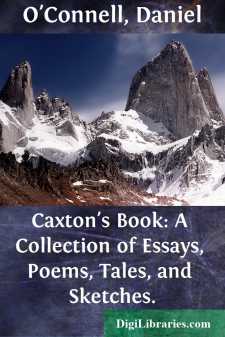Categories
- Antiques & Collectibles 13
- Architecture 36
- Art 48
- Bibles 22
- Biography & Autobiography 813
- Body, Mind & Spirit 142
- Business & Economics 28
- Children's Books 16
- Children's Fiction 13
- Computers 4
- Cooking 94
- Crafts & Hobbies 4
- Drama 346
- Education 46
- Family & Relationships 57
- Fiction 11829
- Games 19
- Gardening 17
- Health & Fitness 34
- History 1377
- House & Home 1
- Humor 147
- Juvenile Fiction 1873
- Juvenile Nonfiction 202
- Language Arts & Disciplines 88
- Law 16
- Literary Collections 686
- Literary Criticism 179
- Mathematics 13
- Medical 41
- Music 40
- Nature 179
- Non-Classifiable 1768
- Performing Arts 7
- Periodicals 1453
- Philosophy 64
- Photography 2
- Poetry 896
- Political Science 203
- Psychology 42
- Reference 154
- Religion 513
- Science 126
- Self-Help 84
- Social Science 81
- Sports & Recreation 34
- Study Aids 3
- Technology & Engineering 59
- Transportation 23
- Travel 463
- True Crime 29
Caxton's Book: A Collection of Essays, Poems, Tales, and Sketches.
by: Daniel O'Connell
Description:
Excerpt
IN MEMORIAM.
At the time when, according to custom, Mr. Rhodes's death was formally announced to the several Courts of Record in San Francisco, one of the learned Judges urged the publication of his writings in some form which would give the bar a permanent memorial of one of it's most esteemed members, and to them their proper place in American literature. This has been accomplished by the present volume. It is sincerely to be hoped that while it will largely add to Mr. Rhodes's reputation, it may also serve to furnish a most interesting family some substantial aid in the struggle with life, from which the beloved husband and tender father has unhappily been removed.
William Henry Rhodes was born July 16, 1822, in Windsor, North Carolina. His mother died when he was six years old, and his father, Col. E. A. Rhodes, sent him to Princeton, New Jersey, to be educated at the seat of learning established there. Col. Rhodes was subsequently appointed United States Consul at Galveston, Texas, and without completing his college course, the son followed his father to his new home. There he diligently pursued his studies. He found many young men like himself, ambitious and zealous in acquiring information, and these he associated with himself in literary and debating clubs, where the most important matters of natural science and political economy were discussed. The effect of this self-bestowed education was most marked. It remained with him all his life. He was thoroughly versed in the political history of the country, and possessed an amount of knowledge concerning the career, motives and objects of politics, parties and public men, which, had he ever chosen to embark in public life, would have made him distinguished and successful. No one ever discussed with him the questions connected with the theory of our government without a thorough respect for the sincerity of his convictions, and the ability with which they were maintained. He was, in theory, a thorough partisan of the Southern political and constitutional school of ideas, and never abandoned them. But he advocated them without passion or apparent prejudice, and at all times shrunk from active connection with politics as a trade. He was an idealist in law, in science and government, and perhaps his early training, self-imposed and self-contained, had much to do with his peculiarities.
In 1844, he entered Harvard Law School, where he remained for two years. Here, as at home among his young friends, he was a master-spirit and leader. He was an especial favorite of his instructors; was noted for his studious and exemplary habits, while his genial and courteous manners won the lasting friendship of his classmates and companions. His fondness for weaving the problems of science with fiction, which became afterwards so marked a characteristic of his literary efforts, attracted the especial attention of his professors; and had Mr. Rhodes devoted himself to this then novel department of letters, he would have become, no doubt, greatly distinguished as a writer; and the great master of scientific fiction, Jules Verne, would have found the field of his efforts already sown and reaped by the young Southern student....


